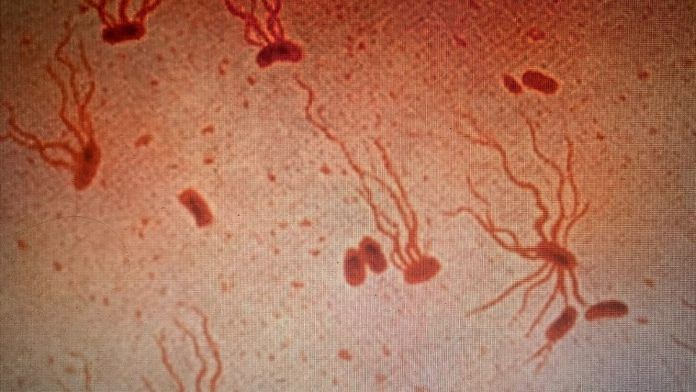New Delhi: Worried that existing tests for typhoid fever are not reliable enough and are aiding the emergence of antibiotic-resistant variants of the disease-causing bacterium, the Indian Council of Medical Research (ICMR) has called upon pharmaceutical companies and research bodies to develop tests that can detect the infection more effectively.
Typhoid is a life-threatening bacterial disease caused by the pathogen Salmonella enterica serovar Typhi (S. Typhi) that spreads through the ingestion of contaminated food and water.
According to the Ministry of Health and Family Welfare, India reports nearly 45 lakh cases of typhoid — the highest in the world — and nearly 9,000 typhoid-related deaths each year. The clinical presentation of typhoid or enteric fever is diverse, encompassing symptoms like high fever, chills, headaches, nausea, vomiting, and gastrointestinal discomfort.
Inviting expression of interest (EOI) for the development of tests that can detect typhoid more effectively, ICMR said existing tests, including the Widal test, TUBEX, Typhidot, and ‘Test-It (KIT)’ have shown “suboptimal sensitivity and specificity”, leading to challenges in accurately identifying typhoid cases at the Point-of-Care Testing (POCT) phase.
“Consequently, healthcare professionals often resort to empiric treatment with antibiotics, which can contribute to the overuse of antibiotics and the emergence of antibiotic-resistant strains of S. Typhi and other bacteria,” read the EOI issued by ICMR on 22 September, a copy of which is with ThePrint. Pursuant to the EOI, promising research projects will receive funding from the ICMR to develop a more effective test for the diagnosis of typhoid.
Dr Kamini Walia, a senior scientist with ICMR who is in-charge of the project, termed the treatment of typhoid through broad-spectrum antibiotics — antibiotics that act against a wide range of disease-causing bacteria — and the resultant emergence of antibiotic-resistant bacteria strains as a ‘major public health concern’.
“And it’s largely because the rapid diagnosis tests for testing typhoid are not very reliable while doctors do not wait for more accurate diagnosis such as blood culture test as the results may take a few days, thus putting the lives of patients in need of immediate treatment in danger,” she told ThePrint.
Also Read: Typhoid bacteria increasingly resistant to key drugs, says Lancet study, flags ‘India risk’
Antimicrobial resistance
According to the ICMR, an estimated 1.1-2.1 crore cases of enteric fever and 1.2-1.6 lakh typhoid-related deaths are reported around the world each year.
Though ICMR says antibiotics have been effective in treating the disease, escalating global antimicrobial resistance has complicated the situation.
S. Typhi, for instance, has developed resistance to multiple antibiotics, including three initially recommended antibiotics or “first-line agents”, says the apex research agency.
What is even more concerning is that the pathogen’s multidrug-resistant strains are prevalent in parts of Asia and Africa such as the ‘extensively drug-resistant’ strain of S. Typhi that reared its head in Pakistan’s Sindh province in 2016. This strain was resistant to fluoroquinolones and third-generation cephalosporins, leaving few antibiotic options available to the patient including azithromycin and costly intravenous carbapenem drugs.
According to Walia, drug-resistant variants of the pathogen have also been reported sporadically from India, which is why the ICMR believes it is imperative to conduct antibiotic susceptibility testing for individual patients before commencing antibiotic therapy.
The research agency cited a related variant, Salmonella enterica serovar Paratyphi (S. Paratyphi), which affects approximately 34 lakh people globally and leads to nearly 19,000 deaths each year. While the morbidity and mortality of S. Typhi make it a greater public health concern, increasing prevalence of S. Paratyphi in certain regions necessitates a next-generation diagnostic test capable of detecting both S. Typhi and S. Paratyphi, said ICMR.
“Moreover, clinical syndromes caused by the two serovars are indistinguishable, making it crucial to differentiate between them before starting antibiotic therapy due to their different antibiotic susceptibility profiles,” ICMR added.
Sensitivity & specificity of typhoid tests
Walia pointed out that tests mostly used for diagnosing typhoid lack the sensitivity (high sensitivity means few false positives) and specificity (high specificity means few false negatives) required for accurate typhoid diagnosis, often yielding false-negative results.
According to ICMR, the effectiveness of existing tests hovers around 75 to 80 percent or even lesser, leaving a substantial margin for misdiagnosis. The gold standard for typhoid diagnosis involves blood culture sensitivity or bone marrow culture sensitivity tests, which are, in fact, recommended in many countries including the US and the UK.
However, these tests require that no antibiotic be introduced into the patient’s system 48-72 hours prior to the test, pointed out Dr Tribhuvan Gulati, lead consultant (diabetes, obesity and internal medicine) at Delhi’s CK Birla Hospital.
This waiting period, he added, can be perilous since the patient’s condition may deteriorate during this time. Moreover, many fever-stricken individuals resort to self-medication or advice from family members, complicating the diagnostic process further.
Against this backdrop, ICMR feels the need for an improved Point-of-Care Testing mechanism to curb overuse of antibiotics that has contributed to emergence of resistance in S. Typhi and other bacteria.
There is an urgent need for indigenously-developed tests that offer higher sensitivity and specificity, said Walia. Such tests, she added, will enable healthcare professionals to promptly and accurately diagnose typhoid, leading to more effective treatment, which in turn, could result in better patient outcomes and reduced antibiotic overuse.
(Edited by Amrtansh Arora)
Also Read: India has sought Nipah monoclonal antibody from Australia, says ICMR DG



